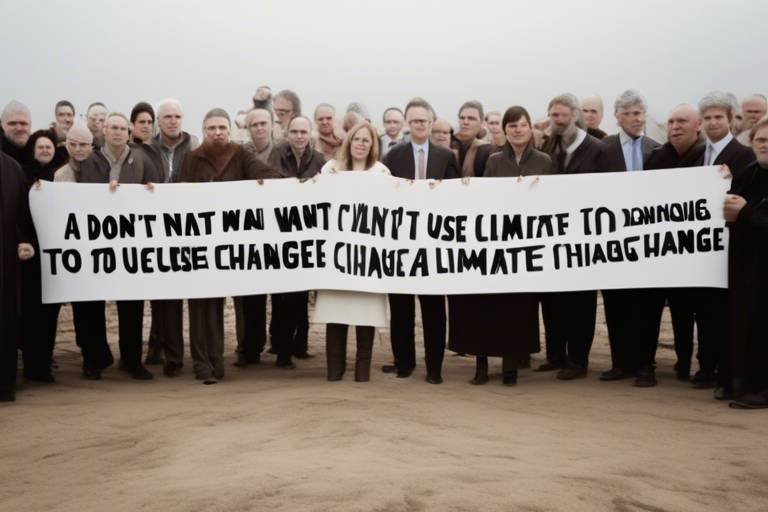Do Politics and Philosophy Play a Role in Science?
The relationship between politics, philosophy, and science is a complex tapestry woven with threads of influence, debate, and discovery. At first glance, one might think of science as a purely objective field, driven solely by empirical data and rigorous methodologies. However, the reality is far more intricate. Politics and philosophy not only shape the questions we ask but also determine the frameworks within which we explore them. This article aims to peel back the layers of this intricate relationship, revealing how political agendas can skew scientific research priorities and how philosophical underpinnings guide our understanding of scientific inquiry.
Imagine a world where scientific research is conducted in a vacuum, free from the clutches of political influence and philosophical debates. Sounds ideal, right? Yet, the truth is that political forces often dictate which research projects receive funding, which theories gain traction, and even how findings are interpreted by the public. For instance, consider climate change research. The urgency of this issue is frequently debated in political arenas, which can lead to funding being funneled toward specific studies that align with prevailing political ideologies. This not only affects the direction of scientific inquiry but also shapes public perception, creating a feedback loop that can stifle or promote scientific progress.
On the philosophical side, the very essence of what constitutes scientific knowledge is rooted in epistemology—the study of knowledge itself. Different philosophical perspectives can lead to varying interpretations of data and theories. For example, a scientific realist might argue that theories are true representations of the world, while an anti-realist might contend that theories are merely useful tools for predicting phenomena. This debate is not just academic; it has real-world implications for how science is conducted and accepted. When scientists operate under different epistemological assumptions, it can lead to significant disparities in how research is approached and understood.
Moreover, the concept of paradigms, as introduced by philosopher Thomas Kuhn, suggests that scientific progress is not always linear. Instead, it often undergoes revolutionary shifts influenced by social factors. These paradigms dictate what is considered acceptable science, which can change dramatically with shifts in political power or philosophical thought. For instance, the acceptance of heliocentrism over geocentrism was not merely a scientific breakthrough but also a philosophical and cultural revolution that challenged the prevailing worldview of its time.
Ethics also play a crucial role in this interplay. The ethical dilemmas faced by scientists are often framed by both political and philosophical contexts. Questions about the morality of certain research practices, such as genetic modification or animal testing, are not just scientific questions; they are deeply political and philosophical matters that require careful consideration. Regulatory bodies often step in to navigate these ethical waters, but their guidelines can be influenced by prevailing political climates and philosophical debates.
In conclusion, the relationship between politics, philosophy, and science is not just a matter of academic interest; it is a dynamic interplay that shapes our understanding of the world. As we navigate this intricate landscape, it is crucial to remain aware of how these forces can influence scientific inquiry and public perception. The next sections will delve deeper into how political climates affect research funding, explore case studies of political influence, and examine the implications of public perception on science policy.
- How does politics influence scientific research? Politics can dictate funding priorities, shaping which research areas receive support and which are neglected.
- What is the role of philosophy in science? Philosophy helps to establish the frameworks and methodologies that guide scientific inquiry, influencing how data is interpreted.
- Can ethical considerations affect scientific outcomes? Yes, ethical dilemmas can lead to changes in research practices and policies, often influenced by political and philosophical contexts.
- Are there historical examples of political influence in science? Yes, many scientific fields, such as climate science and medical research, have experienced shifts in funding and focus based on political agendas.

The Intersection of Politics and Science
When we think about science, we often picture laboratories, researchers in white coats, and the pursuit of knowledge. However, lurking behind this façade is a complex web of political agendas that can shape the very fabric of scientific inquiry. It’s a bit like a movie where the plot twists are dictated not just by the characters but by the producers who control the funding. In this scenario, political priorities can often dictate which scientific questions are deemed worthy of exploration and which are left in the shadows.
Consider this: when a government decides to allocate funds to a specific area of research, it’s not merely a matter of scientific merit. Instead, it often reflects the prevailing political climate and the interests of those in power. For instance, during times of environmental crisis, we might see a surge in funding for climate science, while areas like social sciences may languish in obscurity. This reality raises essential questions about the integrity and objectivity of scientific findings. Are we truly pursuing knowledge for its own sake, or are we merely following the breadcrumbs laid out by political interests?
Moreover, the relationship between politics and science is not just one-sided. Scientists themselves often engage in advocacy, pushing for policies that support their research and the broader societal implications of their findings. This dynamic can lead to a fascinating interplay where scientists become key players in political discussions, influencing public opinion and policy decisions. For instance, scientists advocating for public health measures during a pandemic can significantly sway political action, showcasing how intertwined these fields truly are.
To illustrate this intersection further, let’s look at a few examples:
- Funding for Medical Research: Political support can lead to significant investments in medical research, especially in times of health crises, as seen during the COVID-19 pandemic.
- Climate Change Initiatives: Political will can either bolster or hinder research aimed at addressing climate change, depending on the administration in power.
- Space Exploration: Government priorities often dictate funding for space missions, reflecting broader political goals like international prestige or technological advancement.
In essence, the intersection of politics and science is a double-edged sword. While political support can provide the necessary resources for groundbreaking research, it can also lead to the manipulation of scientific findings to fit political narratives. This reality calls for a vigilant and informed public that can discern the motivations behind scientific research and ensure that the pursuit of knowledge remains a priority, free from undue political influence.
As we navigate this intricate landscape, it becomes clear that the relationship between politics and science is not just a backdrop; it’s a central theme in the ongoing story of human progress. Understanding this relationship is crucial for anyone interested in the future of scientific inquiry and its role in society.

Philosophical Foundations of Scientific Inquiry
The relationship between philosophy and science is as intricate as a finely woven tapestry, where each thread represents a different aspect of human understanding. Philosophy serves as the bedrock upon which scientific inquiry is built, providing essential frameworks that guide researchers in their quest for knowledge. This relationship prompts us to ask: What role does philosophy play in shaping our scientific endeavors? To answer this, we must delve into the various philosophical principles that influence scientific methodologies and the interpretation of data.
At the heart of this exploration lies epistemology, the study of knowledge itself. Epistemology is fundamental to scientific practices, acting as a lens through which we view what constitutes valid knowledge. Different epistemological approaches can lead to varying interpretations of scientific findings. For instance, some may argue that empirical evidence is the cornerstone of scientific knowledge, while others might advocate for theoretical frameworks that provide context to this evidence. This divergence raises an intriguing question: How do our beliefs about knowledge shape our understanding of science?
Epistemology not only influences the methods scientists use but also the questions they choose to investigate. When scientists embark on their research journeys, they often operate under certain assumptions about what can be known and how it can be known. This leads to the adoption of specific epistemological stances, such as:
- Empiricism: The belief that knowledge comes primarily from sensory experience.
- Rationalism: The idea that reason and logic are the primary sources of knowledge.
- Constructivism: The view that knowledge is constructed through social processes and interactions.
These perspectives can drastically alter the trajectory of scientific inquiry. For example, an empiricist might prioritize experimental data over theoretical models, while a constructivist might focus on how scientific knowledge is shaped by cultural and social contexts. This interplay between epistemology and scientific practice is not merely academic; it has real-world implications for how research is conducted and interpreted.
Another philosophical debate that significantly impacts scientific inquiry is the contention between scientific realism and anti-realism. Scientific realism posits that scientific theories aim to accurately describe the world, asserting that the entities posited by these theories (like electrons or black holes) genuinely exist. In contrast, anti-realism suggests that scientific theories are merely useful instruments for predicting phenomena, without necessarily reflecting an underlying reality. This debate raises essential questions: What should we consider as truth in science? and How do these perspectives influence scientific acceptance?
Thomas Kuhn's concept of paradigms further complicates our understanding of scientific progress. According to Kuhn, science does not advance linearly but rather through a series of revolutions triggered by shifts in dominant paradigms. These paradigms shape not only what questions are asked but also how answers are interpreted. For instance, the transition from Newtonian physics to Einstein's theory of relativity exemplifies a paradigm shift that redefined our understanding of time and space. This leads us to ponder: How do societal factors influence the paradigms that govern scientific exploration?
Ethical considerations are paramount in scientific research, often influenced by both political and philosophical contexts. Scientists frequently face ethical dilemmas that challenge their commitment to integrity and objectivity. For example, the use of human subjects in research raises profound ethical questions about consent, risk, and benefit. Regulatory bodies, informed by philosophical principles, play a crucial role in ensuring that ethical standards are upheld. This intersection of ethics, philosophy, and science highlights the importance of a reflective approach to scientific inquiry.
In summary, the philosophical foundations of scientific inquiry are multifaceted and deeply intertwined with the methodologies scientists employ. By understanding the philosophical underpinnings that guide scientific thought, we can better appreciate the complexities of scientific research and the myriad factors that influence its direction and interpretation.
- What is the role of philosophy in science? Philosophy provides the frameworks and principles that guide scientific inquiry, influencing methodologies and interpretations.
- How does epistemology affect scientific research? Epistemology shapes what is considered valid knowledge and informs the questions scientists pursue.
- What are paradigms in scientific research? Paradigms are dominant frameworks that dictate how scientific inquiry is conducted and understood, often shifting through revolutionary changes.

Epistemology and Science
When we dive into the fascinating world of epistemology, we are essentially exploring the very foundations of knowledge itself. What does it mean to know something? How do we determine what is true in the vast sea of information available to us? In the realm of science, these questions are not merely academic; they are crucial to how we conduct research, interpret data, and ultimately, understand the universe around us. The interplay between epistemology and science is a dance of ideas that shapes our scientific practices and methodologies.
To grasp the significance of epistemology in science, we must first consider the different approaches to knowledge that scientists adopt. For instance, some scientists lean towards empiricism, which emphasizes knowledge gained through sensory experience and experimentation. This approach is often contrasted with rationalism, which posits that reason and logic are the primary sources of knowledge. Each epistemological stance brings its own set of values and assumptions to the scientific table, influencing everything from hypothesis formation to data interpretation.
Moreover, the debate between scientific realism and anti-realism plays a pivotal role in shaping scientific inquiry. Scientific realists argue that the world described by science is real and exists independently of our perceptions. On the other hand, anti-realists contend that scientific theories are merely useful instruments for predicting phenomena, devoid of any claim to truth about the world. This fundamental disagreement raises profound questions about the nature of scientific theories and the extent to which they reflect reality.
In addition, we cannot overlook the impact of paradigms, a term popularized by philosopher Thomas Kuhn. Kuhn suggested that scientific progress is not a straightforward accumulation of knowledge but rather a series of revolutions that occur within distinct paradigms. These paradigms are shaped by historical, social, and political contexts, influencing what is considered valid knowledge at any given time. Thus, the epistemological lens through which scientists view their work can significantly affect the trajectory of scientific advancement.
To illustrate this point, consider the following table that outlines the key differences between scientific realism and anti-realism:
| Aspect | Scientific Realism | Anti-Realism |
|---|---|---|
| Nature of Scientific Theories | Theories describe real entities and processes. | Theories are tools for organizing experiences. |
| Truth Claims | Claims can be true or false based on reality. | Truth is not a requirement for utility. |
| Acceptance of Theories | Theories can be accepted based on their correspondence to reality. | Theories are accepted based on their predictive power. |
Ultimately, the relationship between epistemology and science is a complex and dynamic one. It challenges us to consider not just what we know, but how we come to know it. As we navigate through scientific endeavors, recognizing the epistemological underpinnings can enhance our understanding and foster critical thinking. In a world where information is abundant and often conflicting, cultivating an awareness of these philosophical principles is more important than ever.
- What is epistemology? - Epistemology is the study of knowledge, its nature, and how we acquire it.
- How does epistemology relate to science? - Epistemology influences scientific methodologies and the interpretation of data.
- What is the difference between scientific realism and anti-realism? - Scientific realism asserts that scientific theories describe real entities, while anti-realism views them as useful tools without truth claims.
- Why are paradigms important in science? - Paradigms shape scientific progress and influence what is considered valid knowledge.

Scientific Realism vs. Anti-Realism
When diving into the depths of scientific philosophy, one cannot overlook the significant debate surrounding scientific realism and anti-realism. At its core, scientific realism posits that the world described by science is real, regardless of whether we can observe it directly. In other words, scientific realists believe that the entities and processes that science describes—like electrons or black holes—exist independently of our knowledge or perception of them. This perspective encourages scientists to pursue knowledge with the assumption that their theories and models reflect an objective reality.
On the flip side, anti-realism takes a more skeptical stance. Anti-realists argue that scientific theories are merely useful instruments for predicting observable phenomena, rather than true descriptions of the underlying reality. They contend that our theories may change over time and that what we consider "truth" is often shaped by social, cultural, and historical contexts. This viewpoint raises intriguing questions about the nature of scientific knowledge and what it means to "know" something scientifically.
The implications of these two perspectives extend beyond philosophical debates; they can influence practical scientific research and funding decisions. For instance, if a funding body leans towards scientific realism, it may prioritize research that seeks to uncover fundamental truths about the universe. Conversely, an anti-realist perspective might favor projects that focus on developing technologies or methodologies without necessarily aiming to uncover the "truth" about nature.
To illustrate the differences further, consider the following table that summarizes key distinctions between scientific realism and anti-realism:
| Aspect | Scientific Realism | Anti-Realism |
|---|---|---|
| View of Reality | Believes in an objective reality independent of human perception. | Argues that theories are tools for organizing experiences, not reflections of reality. |
| Truth in Science | Considers scientific theories as true or approximately true descriptions of the world. | Views scientific theories as useful fictions or models that may change over time. |
| Scientific Progress | Assumes cumulative progress towards understanding the true nature of reality. | Sees scientific progress as a series of shifts in perspective rather than a linear journey. |
Ultimately, the debate between scientific realism and anti-realism isn't just an academic exercise; it has real-world implications for how science is conducted and funded. It raises essential questions about the nature of knowledge itself: What do we truly know? And how do we know it? As we navigate the complexities of scientific inquiry, understanding these philosophical underpinnings becomes crucial for both scientists and the public alike.
- What is scientific realism? - A philosophical viewpoint that suggests scientific theories describe an objective reality, independent of human perception.
- What is anti-realism? - A perspective that argues scientific theories are not necessarily true descriptions of the world but rather useful tools for prediction.
- How do these perspectives impact scientific research? - They influence research priorities, funding decisions, and the interpretation of scientific findings.

The Role of Paradigms in Science
When we think about the evolution of science, it's crucial to consider the concept of paradigms. Coined by the philosopher Thomas Kuhn in his groundbreaking work, "The Structure of Scientific Revolutions," paradigms are the frameworks that guide scientific inquiry. They represent the set of practices, norms, and theories that define a particular scientific discipline at any given time. Imagine a pair of glasses through which scientists view the world; these glasses filter and shape their observations, interpretations, and conclusions. Without understanding these paradigms, we risk oversimplifying the complex nature of scientific progress.
One of the most fascinating aspects of paradigms is that they are not static. They evolve as new discoveries challenge existing beliefs. For instance, the transition from Newtonian physics to Einstein's theory of relativity marked a significant paradigm shift. This shift didn't just change our understanding of physics; it transformed the entire scientific landscape. Scientists had to reconsider fundamental concepts such as time, space, and gravity, showcasing how a new paradigm can lead to revolutionary advancements.
However, the acceptance of a new paradigm is often met with resistance. This resistance can stem from various factors, including political interests, institutional inertia, and even personal biases. Scientists, much like anyone else, can become attached to their paradigms, and challenging them can feel like questioning long-held beliefs. This phenomenon is often referred to as “normal science”, where researchers work within the existing paradigm until anomalies accumulate to such an extent that a paradigm shift becomes inevitable.
To illustrate this further, consider the following table that highlights key differences between normal science and revolutionary science:
| Aspect | Normal Science | Revolutionary Science |
|---|---|---|
| Definition | Research conducted within the confines of an existing paradigm. | Research that challenges and ultimately replaces the existing paradigm. |
| Focus | Problem-solving within established norms. | Radical change and rethinking of fundamental concepts. |
| Outcome | Incremental advancements. | Major breakthroughs and shifts in understanding. |
Furthermore, Kuhn also introduced the idea that scientific progress is not always linear. Instead, it can be likened to a series of revolutions that disrupt the status quo. Each revolution brings about a new paradigm that redefines the rules of the game, leading to a fresh perspective on previously accepted truths. This cyclical nature of scientific progress emphasizes the dynamic interplay between science and the broader social context in which it operates.
In conclusion, understanding the role of paradigms in science is essential for grasping how scientific knowledge evolves. Paradigms not only shape the questions scientists ask but also influence the methods they use to find answers. As we continue to explore the vast landscape of human knowledge, it's vital to remain open to new ideas and be willing to challenge our own paradigms. After all, the next great scientific breakthrough may just be waiting for someone to take off their glasses and see the world from a different angle.
- What is a scientific paradigm? A scientific paradigm is a framework of theories, methods, and standards that defines a scientific discipline at a particular time.
- How do paradigms influence scientific research? Paradigms guide the questions scientists ask and the methods they use, shaping the direction of research and inquiry.
- What happens during a paradigm shift? A paradigm shift occurs when a new framework replaces an existing one, leading to a fundamental change in scientific understanding.
- Can paradigms change over time? Yes, paradigms are not static; they evolve as new discoveries and insights challenge existing beliefs.

Ethics in Scientific Research
When it comes to scientific research, ethics isn't just a buzzword—it's the backbone that supports the integrity of the entire scientific community. Imagine embarking on a journey into the unknown, where every decision you make could impact lives, ecosystems, or even the very fabric of society. This is the reality for scientists who often find themselves grappling with ethical dilemmas that can arise at any stage of their research. From the initial design of experiments to the dissemination of results, ethical considerations play a critical role in guiding researchers toward responsible practices.
One of the most pressing ethical concerns in scientific research is the treatment of human and animal subjects. Researchers are bound by strict ethical guidelines that ensure the safety and well-being of participants involved in studies. For instance, obtaining informed consent is not just a formality; it’s a fundamental requirement that empowers participants to make educated decisions about their involvement. This principle extends to animal research as well, where ethical considerations dictate that animals must be treated with respect and only used when absolutely necessary. The 3Rs principle—Replacement, Reduction, and Refinement—serves as a guiding framework in this regard, aiming to minimize harm and maximize welfare.
Another significant aspect of ethics in science involves the integrity of data and reporting. The pressure to publish can lead some researchers down a slippery slope where data manipulation or selective reporting might seem tempting. However, the scientific community holds a strong stance against such practices, as they undermine the very essence of scientific inquiry. Transparency is key; researchers are encouraged to share their methodologies and findings openly, allowing others to verify and build upon their work. This not only fosters trust but also promotes a culture of accountability.
Moreover, the ethical implications of scientific advancements cannot be overstated. As technologies evolve, questions arise about their potential misuse. Take, for example, the field of genetics. With the advent of CRISPR and gene editing, scientists are faced with ethical quandaries about how far they should go in altering life itself. The debate often circles around the potential benefits versus the risks of creating unintended consequences, not just for individuals but for entire species and ecosystems. This highlights the need for ongoing dialogue between scientists, ethicists, and policymakers to navigate these complex waters.
To ensure adherence to ethical standards, many research institutions have established Institutional Review Boards (IRBs) or ethics committees. These bodies review research proposals to assess their ethical implications, ensuring that they align with established guidelines. In addition, scientists are often encouraged to engage in ethical training to stay informed about best practices and evolving ethical standards in their fields. This proactive approach can help mitigate ethical breaches before they occur.
In conclusion, the landscape of scientific research is fraught with ethical challenges that require careful consideration and proactive measures. By prioritizing ethics, scientists not only uphold the integrity of their work but also contribute to the broader societal trust in science. As we continue to explore the frontiers of knowledge, let’s remember that with great power comes great responsibility, and the ethical implications of our research should always be at the forefront of our minds.
- What is the importance of ethics in scientific research? Ethics ensures the integrity of research, protects participants, and fosters trust in scientific findings.
- How do researchers obtain informed consent? Researchers provide potential participants with detailed information about the study, allowing them to make an educated choice about their involvement.
- What are the 3Rs in animal research? The 3Rs stand for Replacement, Reduction, and Refinement, aiming to minimize animal use and suffering in research.
- What role do Institutional Review Boards (IRBs) play? IRBs review research proposals to ensure ethical standards are met before a study can proceed.

The Impact of Political Climate on Research Funding
The political climate can significantly affect the allocation of research funding, determining which scientific projects receive support. In many cases, funding decisions are not solely based on the merit of the research itself but are heavily influenced by the prevailing political ideologies and priorities of the government in power. This can create a tug-of-war between scientific integrity and political agendas, leading to a landscape where certain fields flourish while others may struggle for survival.
For instance, during periods of heightened concern about climate change, funding for environmental science may surge. Conversely, in times when economic priorities shift towards industrial growth, research in renewable energy might take a back seat. This dynamic nature of funding can leave researchers in a state of uncertainty, as they must navigate the whims of political cycles. It's almost like trying to catch a wave while surfing; you have to be agile and ready to adapt to the changing tides.
Moreover, the impact of political climate extends beyond just the availability of funds. It also shapes the types of research that are deemed “worthy” of investment. Research that aligns with the current administration’s goals or public sentiment often receives priority, while studies that challenge the status quo or have controversial implications might find themselves starved of resources. This creates a ripple effect, where the direction of scientific inquiry becomes a reflection of political priorities rather than an unbiased pursuit of knowledge.
To illustrate this point, consider the following table that outlines how different political administrations have influenced funding for various scientific fields over the years:
| Administration | Year | Field of Research | Funding Change |
|---|---|---|---|
| Obama | 2009-2017 | Renewable Energy | Increased |
| Trump | 2017-2021 | Environmental Science | Decreased |
| Biden | 2021-Present | Climate Change Research | Significantly Increased |
This table demonstrates that shifts in political leadership can lead to drastic changes in research funding priorities. As you can see, the commitment to renewable energy and climate change has waxed and waned with different administrations, which directly impacts the scientific community's ability to conduct vital research.
Additionally, the political climate can also affect public perception of scientific research. When the government openly supports certain types of research, it can lead to increased public interest and engagement. On the flip side, if political leaders dismiss scientific findings or promote misinformation, it can create a climate of skepticism and distrust towards science. This not only affects funding but also the scientists' morale, as they may feel their work is undervalued or misrepresented.
In conclusion, the interplay between politics and research funding is complex and often contentious. As scientists strive to push the boundaries of knowledge, they must also contend with the realities of the political landscape that can either propel or hinder their efforts. Understanding this relationship is crucial for fostering a scientific environment that prioritizes integrity, innovation, and the pursuit of truth.
- How does political climate affect scientific research?
The political climate can influence the allocation of research funding, determining which fields receive support based on current governmental priorities. - Are there specific examples of political influence on research funding?
Yes, historical shifts in funding for renewable energy and environmental science during different administrations illustrate how political agendas can shape research priorities. - What can scientists do to navigate political influences?
Scientists can engage in advocacy, communicate the importance of their work to the public, and collaborate with policymakers to ensure that research is prioritized regardless of political changes.

Case Studies of Political Influence
When we think about the intertwining of politics and science, it’s essential to look at real-world examples that illustrate this complex relationship. One prominent case is the Climategate scandal of 2009, where leaked emails from climate scientists raised questions about data manipulation and transparency. This incident not only sparked intense debate about climate change but also highlighted how political agendas can overshadow scientific integrity. The fallout led to a significant shift in public trust towards climate science, demonstrating how political narratives can shape public perception and, consequently, funding priorities.
Another striking example is the funding fluctuations in stem cell research in the United States. Under President George W. Bush, federal funding for embryonic stem cell research was severely restricted, reflecting his administration's political and ethical stance on the issue. This decision stifled potential breakthroughs in medical science and forced many researchers to seek funding from private sources, which often have different agendas. The political climate shifted again with President Obama, who lifted these restrictions, leading to a resurgence in research and potential innovations in regenerative medicine. This case illustrates how political leadership can directly influence the trajectory of scientific research and its funding.
To further emphasize the influence of politics on science, we can examine the impact of the COVID-19 pandemic on vaccine development. The urgency to develop vaccines led to unprecedented funding and collaboration between governments and pharmaceutical companies. However, the political discourse surrounding vaccine efficacy and safety created a divide in public opinion. Misinformation campaigns, often fueled by political motives, complicated the public's understanding and acceptance of the vaccines. This case serves as a reminder of how political narratives can either propel scientific progress or hinder it, depending on the prevailing attitudes and beliefs.
Here’s a concise overview of these case studies:
| Case Study | Political Influence | Impact on Science |
|---|---|---|
| Climategate | Leaked emails questioned integrity | Shifted public trust in climate science |
| Stem Cell Research | Funding restrictions under Bush | Stifled research, shifted to private funding |
| COVID-19 Vaccine Development | Political discourse on vaccine safety | Public division on vaccine acceptance |
These examples illustrate that the relationship between politics and science is not just theoretical; it has real-world implications that can either advance or hinder scientific progress. As we continue to navigate through complex global challenges, understanding this relationship becomes increasingly vital. We must remain vigilant and critical, ensuring that scientific inquiry is guided by evidence rather than political expediency.
- How does politics influence scientific research?
Politics can dictate funding priorities, research agendas, and public perception of scientific findings, often leading to biased outcomes. - What role does philosophy play in science?
Philosophy shapes the methodologies and theories of science, influencing how knowledge is constructed and interpreted. - Can political agendas undermine scientific integrity?
Yes, when political interests prioritize certain outcomes, they can compromise the objectivity and integrity of scientific research.

Public Perception and Science Policy
Public perception plays a pivotal role in shaping science policy, often acting as a double-edged sword. On one hand, a well-informed public can advocate for robust funding and support for scientific initiatives, while on the other, misinformation or skepticism can lead to significant setbacks in scientific progress. It's fascinating how the views of the general populace can influence not just the direction of research, but also the types of projects that receive funding. For example, when a particular scientific issue, such as climate change or vaccination, becomes a hot-button topic, the political landscape shifts dramatically, often aligning with public sentiment.
Consider this: when the public expresses strong support for renewable energy, policymakers may feel compelled to allocate more resources towards solar and wind energy research. Conversely, if a segment of the population remains skeptical about the efficacy of vaccines, funding for related research may dwindle, regardless of scientific consensus. This dynamic relationship between public perception and science policy underscores the importance of effective communication in science. Scientists and policymakers must work together to convey accurate information and dispel myths that could hinder scientific advancement.
The implications of public perception extend beyond funding; they also influence legislation and regulatory frameworks. For instance, when public concern about genetically modified organisms (GMOs) surged, many governments responded by imposing stricter regulations on GMO research and development. This creates a challenging environment for scientists who are eager to explore the potential benefits of such technologies. As a result, the interplay between public opinion and science policy can either foster an environment of innovation or create barriers that stifle progress.
To illustrate this relationship, let’s take a closer look at a few key factors that shape public perception and, consequently, science policy:
| Factor | Impact on Public Perception | Effect on Science Policy |
|---|---|---|
| Media Coverage | Can amplify fears or excitement about scientific issues | Influences funding priorities and regulatory actions |
| Education | Informs the public about scientific processes and findings | Encourages support for science initiatives |
| Political Rhetoric | Shapes narratives around scientific topics | Affects legislation and funding allocation |
In conclusion, the relationship between public perception and science policy is complex and multifaceted. It requires ongoing dialogue between scientists, policymakers, and the public to ensure that science can thrive in an environment that is both supportive and informed. As we navigate this intricate landscape, it is crucial to foster a culture that values scientific literacy and encourages critical thinking. Only then can we hope to align public perception with the realities of scientific inquiry, paving the way for policies that truly reflect the best interests of society.
- How does public perception influence scientific research?
Public perception can dictate funding priorities, influence policy decisions, and shape the regulatory environment surrounding scientific research. - What role does media play in shaping public perception of science?
Media coverage can either promote understanding and excitement about scientific advancements or exacerbate fears and misinformation. - How can scientists effectively communicate their findings to the public?
Scientists can engage in outreach, utilize social media, and collaborate with educators to convey their research in an accessible and relatable manner.
Frequently Asked Questions
- How do politics influence scientific research?
Politics can significantly shape scientific research by determining funding priorities and directing the focus of studies. When political agendas prioritize certain issues, those areas receive more funding and attention, which can lead to biased outcomes in scientific findings.
- What role does philosophy play in science?
Philosophy underpins scientific inquiry by providing frameworks for understanding knowledge and methodologies. It helps scientists consider the implications of their work and the ethical dilemmas they may face, guiding them in interpreting data and forming theories.
- What is epistemology and why is it important in science?
Epistemology is the study of knowledge and belief, and it is crucial in science because it influences how scientists determine what is accepted as valid knowledge. Different epistemological approaches can lead to varying interpretations of data and scientific theories.
- What is the debate between scientific realism and anti-realism?
This debate centers on whether scientific theories accurately describe reality or are merely useful tools for predicting phenomena. Scientific realism argues that theories reflect true aspects of the world, while anti-realism suggests that theories are not necessarily true but can still be effective.
- How do paradigms affect scientific progress?
Thomas Kuhn's concept of paradigms illustrates that scientific progress is often influenced by prevailing social and cultural factors. When a dominant paradigm shifts, it can lead to scientific revolutions that change the course of research and understanding in a field.
- What ethical dilemmas do scientists face?
Scientists often encounter ethical dilemmas related to their research, such as issues of consent, integrity, and the potential impact of their findings. These dilemmas are shaped by both political and philosophical contexts, making it essential for scientists to navigate these challenges carefully.
- How does the political climate affect research funding?
The political climate can greatly influence which scientific projects receive funding. Political priorities can lead to shifts in funding allocations, often favoring certain research areas over others, which can impact the progress and direction of scientific inquiry.
- Can you provide examples of political influence in science?
Yes, historical case studies have shown that political influences can lead to significant shifts in funding and research focus. For instance, during certain administrations, climate change research may receive less funding, while other areas, such as health research, may gain prominence based on political interests.
- How does public perception shape science policy?
Public perception of science is often influenced by political narratives, which can directly affect science policy. When the public supports or opposes certain scientific initiatives based on political discourse, policymakers may adjust funding and support for those initiatives accordingly.



















